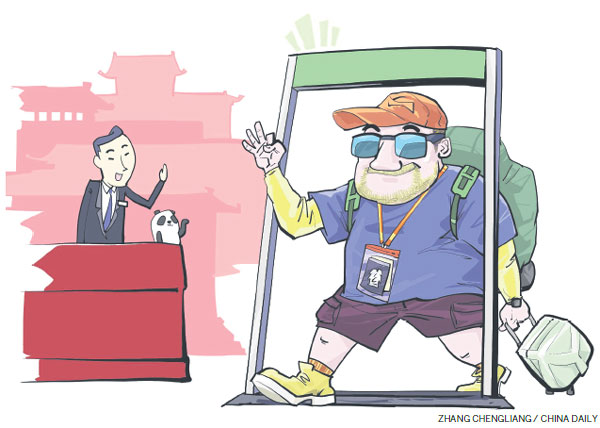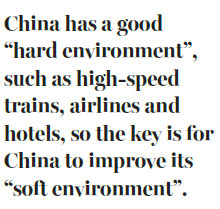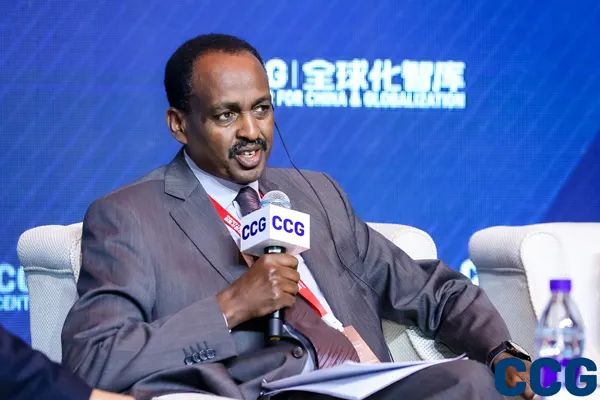Wang Huiyao: More should be done to lure tourists
July 21 , 2017
China should be more professional and international in promoting its plentiful resources to attract more foreign visitors
Although China’s outbound tourism has been consistently increasing for the past few years, a report released recently by the Center for China and Globalization (CCG) showed that the situation of China’s inbound tourism is not as ideal. In 2015, the number of inbound tourists was 30 million fewer than that of outbound ones.
In the age of globalization, the tourism industry has been a pillar to push forward the world’s economic development. In the past two years, the whole revenue of the global tourism industry accounted for about 10 percent of global GDP, and the number of jobs that the tourism industry offered also accounted for about 10 percent of the number of jobs worldwide. The tourism industry also pushes forward the global flow of goods, capital, talent and people.
With the sustainable development of the economy and the increase of people’s income in China, Chinese tourists, who have great consumer power, have been popular with overseas markets. The number of outbound tourists in 2015 was 312.9 percent higher than that in 2005.
However, in the past 11 years, the number of China’s inbound tourists has increased by only 11 percent. The growth is not only slower than that of developed and emerging economies, but is also lower than the average of the Asia-Pacific region over the same period, which is about 81.3 percent.
If China’s tourism resources are considered, the country has many large scenic destinations, cultural relics and historical sites, as well as a rich variety of delicious cuisines. China could be one of the countries with the richest tourism resources. It also has world-class high-speed trains, airlines and hotels. However, whether China can attract overseas tourists depends on the convenience of its infrastructure and the opening and inclusiveness of its culture, and is also a test of the country’s comprehensive power.
At present, China has a good “hard environment”, such as high-speed trains, airlines and hotels, so the key is for it to improve its “soft environment”, such as visa policies, services and promotions, to attract more overseas tourists.
First, China should further simplify the procedures for exit and entry for expatriates, and make it more convenient for overseas tourists to get a tourist visa. The nation could borrow experiences from countries such as Canada and Japan, to make easier visa policies for overseas tourists or to help them stay longer, as long as the tourism policies will benefit China’s national economic development. The policy of 72-hours visa-free transit should also be practiced in more cities in China.
At present, there are some inappropriate practices that could become barriers for overseas tourists to have very good experience in China. For example, when expats enter China, they have already provided detailed information that is required by immigration authorities. But the government still ask them to report to local police offices within 24 hours after entry, which makes it more inconvenient for them.
Second, China could increase its population of expats. Imagine that, if one expat who lives in China has 10 friends come and visit, then a million residents will bring more than 10 million tourists to China. So if China can loosen restrictions for overseas students and expats to study or work, they will also bring over more tourists.
Third, China should be more professional and international in terms of the promotion of its tourism resources, and can learn from other countries that are successful in the tourism industry, including how to make detailed promotion plans to cater to customers from specific markets, how to showcase the uniqueness of China’s different tourism resources in different regions, and how to better understand overseas tourists’ requirements. The tourism administration bureaus could work together with tourism companies to better understand specific requirements of foreign tourists. Meanwhile, they could also establish more offices in different regions that would be responsible for the promotion of tourism.

Last but not least, China should make its infrastructure and services more global. China’s infrastructure has been built very quickly, but sometimes the builders didn’t put themselves into the users’ shoes and think about more services and infrastructure that are user friendly, which can give tourists negative impressions. With the globalization process and the development of the Belt and Road Initiative, more expats will come to China, so services in the tourism industry should also be improved. For example, more road signs in China could have an English version so that visitors will understand them, and the English language skills of Chinese people, especially those serving tourists, should be improved.
Industries related to tourism are different from others, because they target individuals. The supply of products and services has to exactly match the market’s demands. It is important for China to understand what the world’s tourists need and to serve them properly. In the past, many traveled to Beijing to see the Great Wall, but it is important that we let people know there are many other sights worth seeing, and provide good services so that they can have a better experience. For tourists from different countries, we can also offer different services to cater to their specific needs.
The index of tourism could reflect well the comprehensive power of a country. So it is really important that China make a better “soft environment” to attract more overseas tourists and to develop its tourism industry.
The author is president of the Center for China and Globalization, a Beijing-based think tank. The views do not necessarily reflect those of China Daily.






